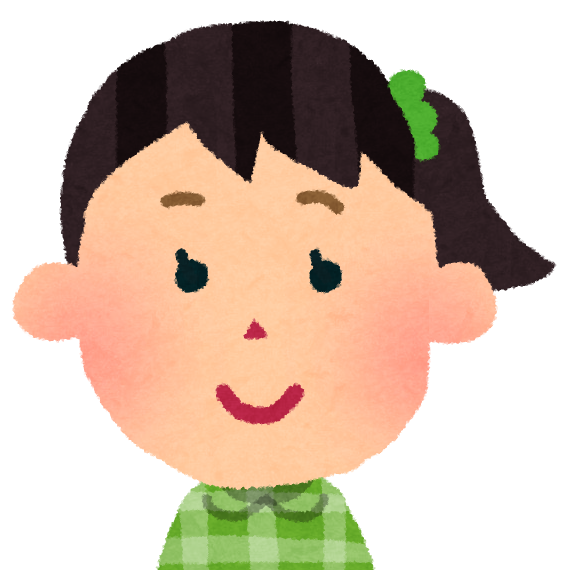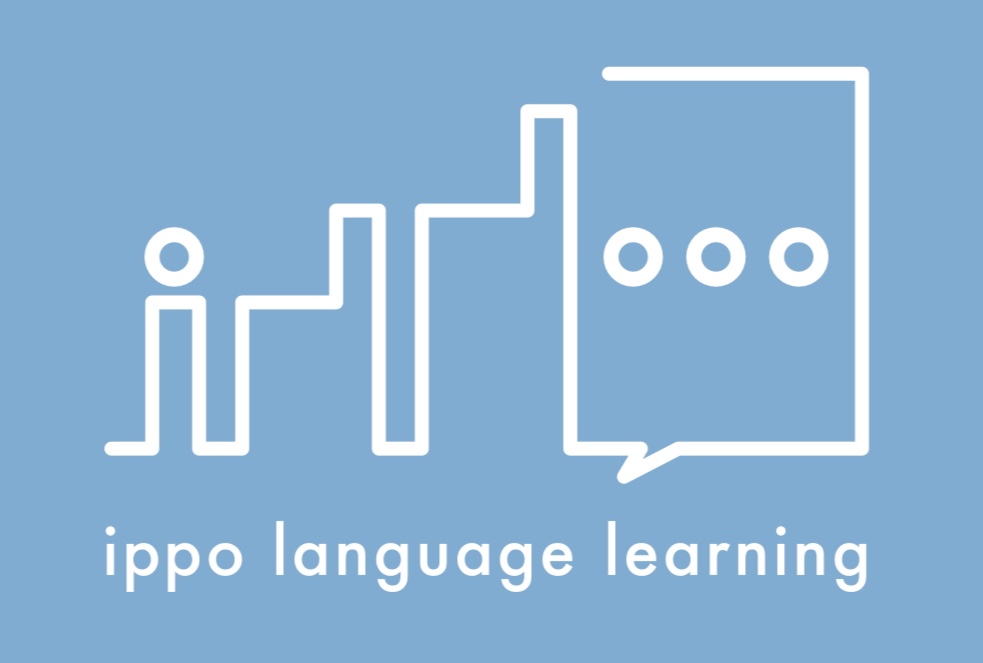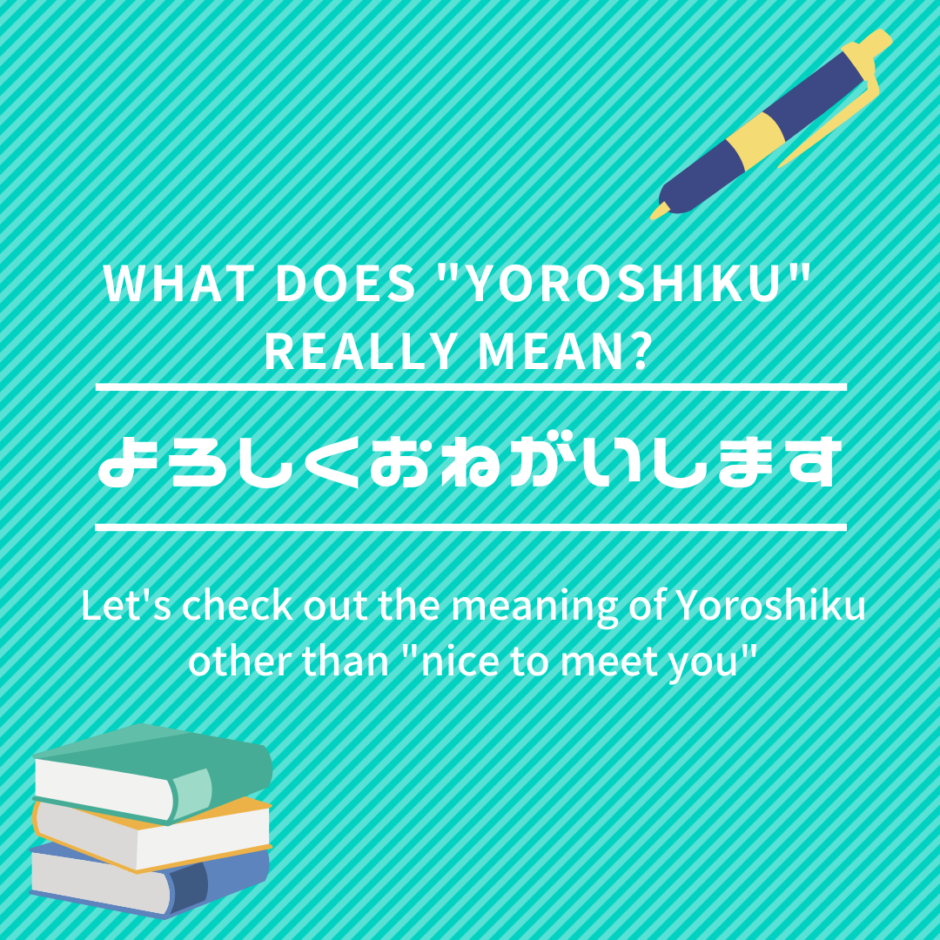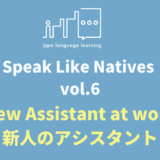よろしくおねがいします(Yoroshiku onegaishimasu)is probably the phrase that you learn at the very beginning of your Japanese study as self-introduction.
Your teacher might tell you that よろしく means “nice to meet you”,
which is partly right.
But when you carefully listen to Japanese people’s conversation,
You’ll notice that よろしくis used in a various situations,
and you might be confused what よろしくreally means.
Today let’s focus on the phraseよろしく or よろしくおねがいします
and learn its real meaning depending on the situation that is used.
No. 1 Nice to meet you.
This is probably the most well-known usage for Japanese learners.
When introducing your self, you would say,
はじめまして。____です。どうぞよろしくおねがいします。
Hajimemashite, __(your name)__desu. Douzo yoroshiku onegaishimasu.
Nice to meet you. I’m ________. Nice to meet you(!?!?!?)
Here you might wonder why you need to say “nice to meet you” twice in a different way, and what the difference is between “Hajimemashite” and “Yoroshiku”, right?
So literally, よろしくおねがいします is not really “nice to meet you”.
When you meet someone new and start the relationship,
it is likely that in the near future you’ll help with each other or spend time together with that person.
So Yoroshiku onegaishimasu when introducing yourself literally means
“I thank you in advance for whatever the effort you would give me in the future”.
Have you heard the phrase “一期一会(いちごいちえ/ichigo-ichie)” ?
一期一会 means “once-in-a-lifetime opportunity”.
This is a phrase that originated in Tea ceremony culture in Japan.
Traditionally Japanese people treated every meeting as a precious opportunity.
That is probably the reason why people in Japan tend to say よろしくおねがいします(or thank you for your help in advance)often when introducing themselves to people whom they meet for the first time.
When people say よろしくor よろしくおねがいします for greeting, they don’t really think of the its origin or the real meanings any more, but behind よろしく there seems to be a lot of cultural backgrounds!
Summary:
よろしくおねがいします when introducing yourself means:
Nice to meet you.
But literally means; I thank you in advance for your effort to keep our relationship.
No. 2 Please say hello to….
The next よろしく is the situation where you and your friends are talking about the mutual friends/ family, and say;
____によろしく!
__(your friend’s name)__ ni yoroshiku!
This means “please say hello to ___(your friend)__”
The conversation example is like this;

そういえば、こんど あやちゃん に あうんだ!
Souieba, kondo Aya-chan ni aunda!
Btw, I’m meeting Aya-chan soon.

そうなんだ!じゃあ、あやちゃんによろしくね。
Soundanda! Jyaa Aya-chan ni yoroshiku ne.
Oh really! Well, please say hi to Aya-chan for me!

わかった!つたえておくね。
Wakatta! Tsutaeteoku ne.
Ok! I will!
The formal version is
___によろしくおつたえください。
___ni yoroshiku otsutae kudasai.
So when you are talking with people older than you or those in a high position at work, you need to add “おつたえください(otsutae kudasai)” after よろしく(yoroshiku).

山田(やまだ)さんが去年やりとりしていたA社(しゃ)の佐藤(さとう)さんに夕食(ゆうしょく)にさそわれてね。
Yamada san ga kyonen yaritori shiteita A-sha no Satou-san ni yuushoku ni sasowarete ne.
I was invited for dinner by Mr. Satou from A company, the one you worked with last year.

そうですか。佐藤さんにどうぞよろしくおつたえくださいね。
Soudesuka. Satou san ni douzo yoroshiku otsutae kudasaine.
Oh really. Please send my best regards to Mr. Satou.
No. 3 I will leave this to you!
When you ask somebody to do something for you, you also use “よろしく”.
Situation is like this;

あー!牛乳(ぎゅうにゅう)きれてた…!
Ah! Gyu-nyu kireteta…!
Oh no…I forgot that we’re out of milk!

買(か)ってこようか?
Katte koyou ka?
Should I go get one?

ごめん!よろしく〜!
Gomen! Yoroshiku-!
Thank you! I’ll leave it to you!
This よろしくcan be often used in a business situation as well.

やまださん、悪(わる)いけどこれコピーとっておいてくれない?
Yamada san, waruikedo kore kopii totteoite kurenai?
Ms. Yamada, I’m sorry but can you get the copy of this document?

はい、わかりました。
Hai, wakarimashita.
Okay!

よろしくおねがいします。
Yoroshiku onegaishimasu.
Thank you in advance.
No. 4 Let’s keep in touch!
When Japanese people say “これからもよろしく(korekara mo yoroshiku)!” or “またよろしく(mata yoroshiku)!”
that means “let’s keep in touch!” or “Looking forward to seeing you soon”

今日(きょう)はすごくたのしかった!ありがとうね。
Kyou wa sugoku tanoshikatta! Arigatou ne.
I had a blast today! Thank you!

わたしもたのしかった!
Watashi mo tanoshikatta!
Me too!

またよろしくね。
Mata yoroshiku ne.
Looking forward to seeing you soon!

うん!こちらこそよろしく!
Un! Kochira koso yoroshiku!
For sure! I’ll look forward to seeing you too!
よろしく/よろしくおねがいします means;
1. Nice to meet you!
2. Please say hi to___!
3. I will leave this to you!
4. Let’s keep in touch!
Please leave comments if you like this post!
今後とも、よろしくおねがいします。
Kongo tomo, yoroshiku onegaishimasu.
Looking forward to seeing you soon!



